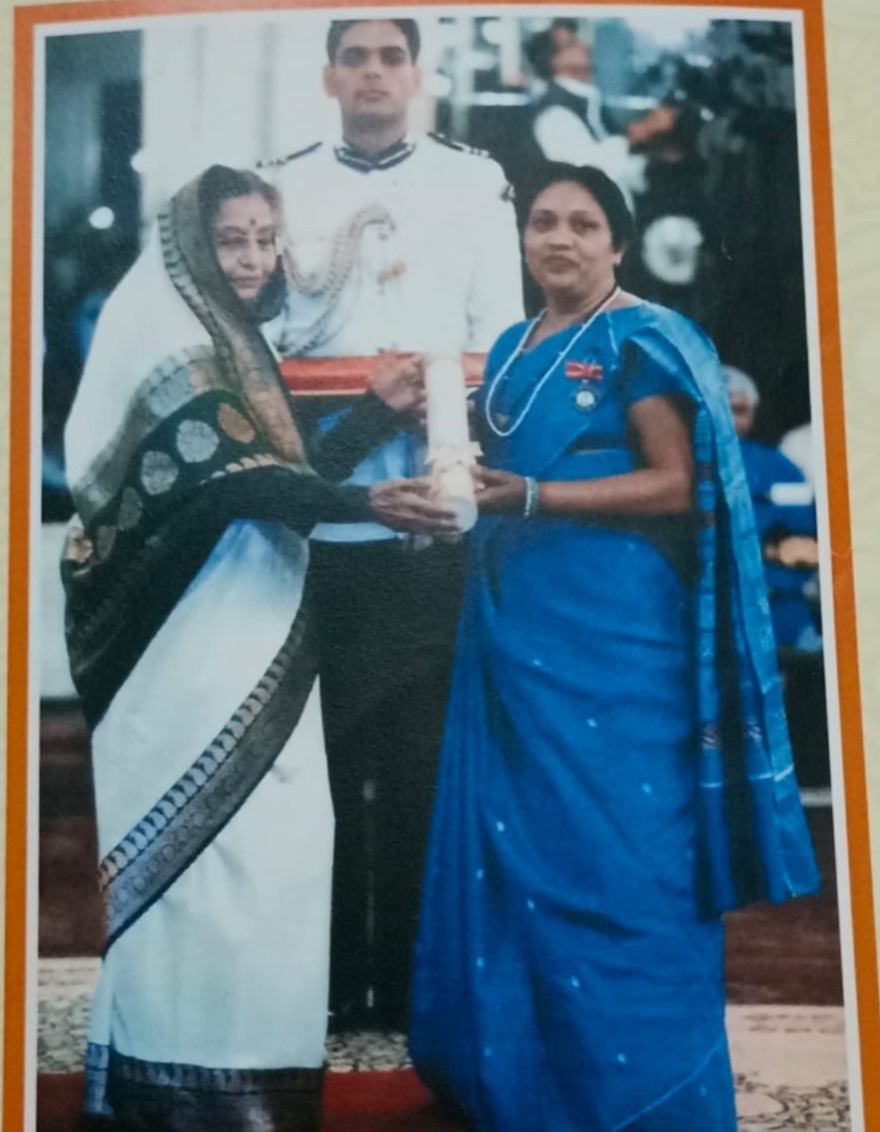
Mandakini Mishra/Raipur
Padma Shri awardee Shamshad Begum is a one-woman Army whose work and focus on inclusion have led to building one of India’s most inspiring grassroots networks, empowering thousands of women in Chhattisgarh to lead safer, self-reliant lives.
Her journey began in the small town of Balod, where she witnessed firsthand the barriers women faced. “I wondered why daughters were stopped from studying; why they were not allowed to move forward,” she recalls. “I resolved that if I ever got the opportunity, I would work for women’s education and empowerment.”
Coming from a Muslim family, Shamshad drew inspiration from her mother, Aamna Bee, who balanced work and education to ensure all her six children received an education. This foundation became the driving force behind Shamshad’s lifelong commitment. Her path-breaking work was recognised when she was listed among 100 influential Muslim women who were honoured for their role in India’s development.
.jpeg) Shamshad Begum's woman commandoes taking oath to change their lives
Shamshad Begum's woman commandoes taking oath to change their lives
In 1990, Shamshad joined the National Literacy Mission Programme in Gundardehi block and launched a campaign for women. In just six months, 12,269 of 18,265 illiterate women became literate — surely an extraordinary achievement. She ensured continuity by establishing self-help groups that linked women to savings and income-generating activities.
Over time, Shamshad helped form 1,041 self-help groups, collectively saving around ₹2 crore. These groups launched ventures ranging from soap-making and bullock-cart wheels to grocery shops. Her efforts were supported by both local administration and rural communities, and she founded the Mahila Bhavan, a safe space and leadership hub for women to organise, inspire, and lead.
In 2006, Shamshad mobilised women at the grassroots to combat social evils and ensure government welfare reached the people. These women, known as “Women Commandos” or Special Police Officers, actively worked against alcoholism, domestic violence, dowry practices, and human trafficking. Linked with local police as “police friends,” the initiative started with 100 women in Gundardehi and now spans 14 districts of Chhattisgarh.
.jpeg)
Shamshad Begum (Extreme left) with her warriors
Remarkably, neither the women commandos nor Shamshad’s organisation receives government funding. Yet, they continue to patrol villages in red saris with caps, whistles, and torches, fostering crime- and drug-free communities. Today, the network has grown to 15,000–65,000 women across 30 districts, with community support from officials helping provide essential resources. Awareness drives have contributed to a 20% drop in liquor sales and a 23% reduction in domestic violence.
Shamshad’s journey began humbly in 1990, teaching 25 women at home before joining the Mahila Mandal and volunteering as deputy convener for Gundardehi block. Among 18,000 illiterate people in 163 villages, she led a village-to-village campaign that increased literacy rates from 52% to 75%, marking her first major success.
Today, women commandos are engaged in sanitation, environmental protection, water conservation, voter awareness, road safety education, promotion of girls’ education, and prevention of child marriage. Since 2010, around 10,000 girls have received educational materials through her initiatives. Stitching and handicraft training have empowered women to become “Lakhpati Didis”, creating sustainable livelihoods and involving male family members in economic activity.

Shamshad Begum receiving Padma Shri from President Pratibha Devi Patil
Shamshad’s extraordinary work has earned her the Padma Shri (2012), Janki Devi Bajaj Award, Bhagwan Mahavir Award, Nari Shakti Samman, and Minimata Samman. In 2025, she received the Koshal Putri Award, which documented her life and contributions. She continues to guide women commandos, provide strategic support, and expand into new districts through organisations like Sahyogi Jankalyan Samiti and NABARD, training women in leadership, legal rights, protective behaviour, and justice processes.
Shamshad candidly acknowledges the challenges she faced as a Muslim woman: raising young children while pursuing her mission amidst societal taunts. Yet she persevered. Appointed project coordinator of Gundardehi block in 1995, she helped thousands of women and men gain literacy and economic independence, creating around 3,500 self-help groups.
ALSO READ: 10 inspiring stories of Changemakers from Chhattisgarh
In 2000, under the Mitanin Programme, she launched a pilot project to reduce maternal and infant mortality, training 500 volunteer health workers and 20 trainers. This initiative led to an 80% increase in immunisation and institutional deliveries, further demonstrating her commitment to holistic community development.
